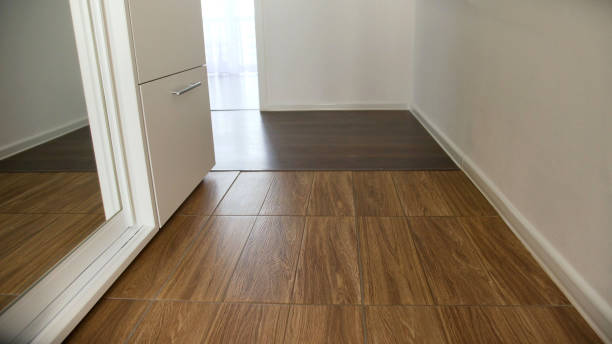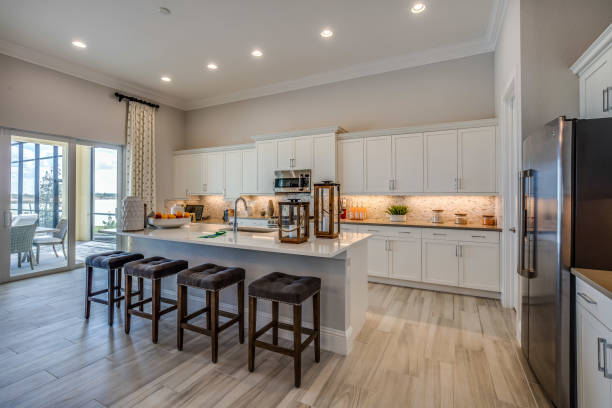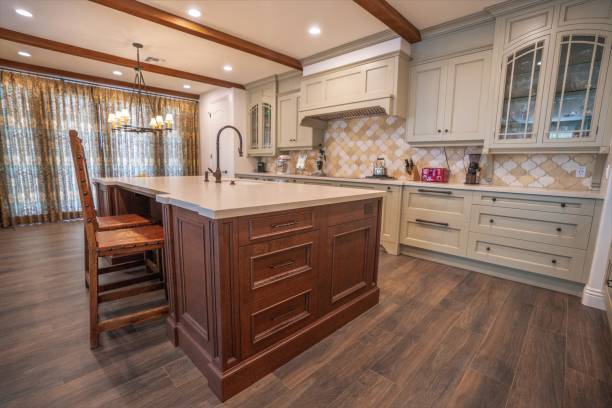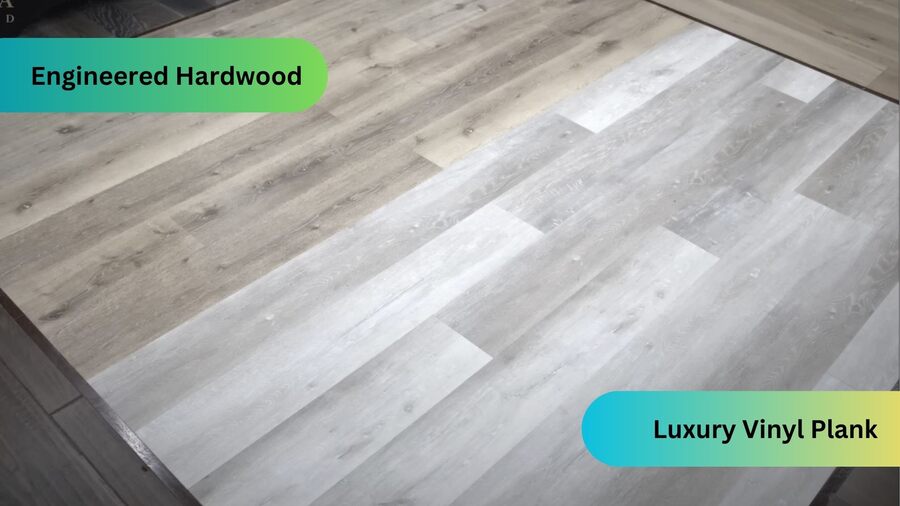While making flooring choices, you have options such as Luxury Vinyl Plank (LVP) and engineered hardwood. And both have good and bad aspects.
But here’s the thing: you can have a good-looking floor which is also practical. LVP is incredibly hard-wearing, and it is not sensitive to water because it is thick and has a strong wear layer. However, if you are a wood lover, you will love the natural look of engineered hardwood. It will depend on the amount you are ready to spend and what you love.
We will be putting two popular floors against each other in this article– luxury vinyl plank and engineered hardwood. We will go through what their composition is, how they’re distinct, and what they have in common. We’ll also tackle items such as how they look, how hard they are, if they can take moisture, how to clean them and how much they cost and how to fit them in. Thus, let’s start and realise which one is best for you.
What is Engineered Hardwood?
Engineered hardwood is like a sandwich: on a closer look, this product compounds the synthetic top surface with the natural core layer underneath. This core comprises multiple layers of wood placed in different directions. We love it as it prevents the wood from swelling unevenly, which is a common problem for wide planks.
Engineered hardwood flooring is like putting together puzzle pieces. It’s made in long strips that easily fit together. Many of them have a thin layer of real hardwood. However, under the surface there are either thicker plywood or MDF layers.
Engineered floors come ready to go: they’re already finished, so the finish is extra strong. In addition, if you opt for wire-brushed finish, it hides scratches better.
The top layer of real wood is what you see: after it has been set up, the person can’t distinguish engineered from solid hardwood. However, the underneath parts give it strength saving material as a result.
Pros and Cons of Engineered Hardwood Flooring
Pros:
- Looks nearly identical to hardwood
- Affordable
- Can be refinished
- Eco-friendly option
- Dimensionally stable
- Long lifespan
Cons:
- Can’t handle excessive water
- Scratches easily
- Some varieties can fade in sunlight
- More expensive than LVP
- Refinishing is limited to wear layer thickness
What is LVP (luxury vinyl plank)?
LVP or luxury vinyl planks are also known as SPC, a composite of stone and plastic. It consists of various materials, and its popularity stems from its durability, long lifespan, and close resemblance to real wood.
Imagine it as layered cake: LVP flooring is just like this. Vinyl records compose it, arranged one above the other. A transparent cover is on the top to save the wooden print design. It is this design layer that gives it the look of real wood upon installation. Apart from that, there’s a coating of aluminium oxide to prevent any scratches.
LVP is a multi-layered product consisting of a base, core, design and wear layer. The more layers and the fatter they are, the better the LVP. The design layer is the one that makes it look like wood. The wear layer is super important – it’s what protects the flooring from scratches and stains. The “P” in LVP means it’s not like other vinyl floors in that we have sheet vinyl and vinyl till now.
Pros and Cons of LVP Flooring
Pros:
- Affordable
- Easy installation
- Very durable
- Low Maintenance
- Ideal for floating floor installation
- Doesn’t require perfectly level subfloor
Cons:
- Hard to remove if glued down
- Some varieties are prone to fading in sunlight
- Can dent easily under weight
- Can’t be refinished
- Relatively short lifespan
Also Raed: WPC vs SPC Flooring | Which is Better Choice for New Home
Engineered Hardwood Vs Luxury Vinyl Plank
Appearance:
In the aspect of Appearance, engineered hardwood is the same as real wood floors. Sometimes, we get the boards in different sizes, the same wood patterns, and the deep colours that make real wood just irresistible. We will find some of the common wood types like oak or maple or even something exotic like Brazilian cherry.
LVP flooring has really excelled at looking and feeling like wood. They try beautiful printing to make the wood patterns and textures look real. Furthermore, they have the ability to give them an aged or worn-out appearance. Though it is not wood, the similarities between today’s LVP and real wood are amazing.
We can make both of these floors give you a classic or contemporary natural look. On the other hand, if you want the real deal, choose engineered hardwood flooring. If you prefer spending less, LVP is the flooring for you.
Durability:
Engineered hardwood and luxury vinyl planks are both tough for daily life. However, LVP usually won over the audience because it was very durable.
There is a vinyl cover on top that protects the surface from scratches, dents and water. With waterproof vinyl plank flooring, even if kids, pets, or spills occur, it still withstands the test of time. And it conceals any such signs of wear and tear very well, so it looks new for a long time.
With time, scratches or dents could occur on engineered hardwood. Yet, if we sand it and refinish it, it will be as good as new.
While LVP is harder, some people believe it hides the natural wood ageing. A few marks and marks are the characteristics of real wood, as you put it to use.
Therefore, as your floor gets older, reflect on the look that you want it to have. If you want floors that don’t show signs of wear, go for LVP, but if you want floors that develop a unique character with flaws and all, go for engineered wood.
Installation:
One of the reasons why DIY installation of the new dream flooring becomes easier is luxury vinyl planks. Connectible floating systems and click-together systems are available, and you can lay the light boards over the old floors. Some others even manage to put it up in two days.
However, with the engineered hardwood, it becomes a little more difficult. You might be in need of specialists to nail it down, glue or set it as a floating floor. The boards are thicker and heavier than that of vinyl, so it is very hard to move them. Right installation of it is already very important to stop wood swelling.
Yet others do not like the sound of vinyl plank under their feet – it can be quite hollow and somewhat plasticky. Engineered wood, in contrast, is more solid and sounds like real wood, which some furniture lovers select despite the hassle of installation.
Therefore, the kind of floor you pick depends on how much you intend to DIY. If you want a simple DIY project, go for vinyl planks. However, if you value quality and don’t mind some assistance, engineered woodcuts. So, no matter which option you choose, a professionally installed floor will give it that extra special feeling from the very beginning.
Costing:
Luxury vinyl plank is the cheaper option in this case. It pays off in almost every way, even if you pay someone to install it. The engineered hardwood is a bit more expensive than vinyl plank but not as pricey as the solid hardwood. Therefore, it’s a cheaper alternative to get actual wood in the world of high prices.
On the other hand, putting up engineered timber may be more expensive since you may have to enlist the services of professionals. LVP allows you to DIY without spending much.
Keep in mind that even though vinyl might be cheap, real wood could add more value to your home in the long run.
For savings seekers, choose LVP. If you can spend just a little bit more, go for the engineered wood for that very same real wood look.
Make sure to request quotes before making any decision so that you can be sure how much everything will cost!
Maintenance:
You can keep floors organized with LVP and pine laminate wood. They are both simple and convenient. With these tools, you can sweep, vacuum, and scrub your floor. But, just be careful and keep water consumption to a minimum when cleaning your engineered hardwood floor.
Take time out to go through the cleaning product manufacturers first before you do any cleaning stuff though. Try it in the most hidden and secure area initially, even if the moisture emerges because of fog on the windshield or unexpected drizzle on a sunny day.
Weather Tolerance
The luxurious vinyl plank (LVP) is great at keeping water out, just better than the engineered hardwood. Some LVP floors are waterproof, meaning water does not damage them at all.This makes them an ideal choice for places such as kitchens, bathrooms, and basements because there is water.
LVP is made of vinyl, so water doesn’t bother it. But the important thing is to stop water from getting under the floor. That’s why they make waterproof LVP planks – to keep water out when they’re put in right.
Engineered hardwood is not waterproof. However, it is better with water than solid wood. This happens because it’s laminated using plywood layers that don’t move much when they get wet. However, it is not suited for extremely wet locations.
Which is the Better Choice for My Home’s Flooring?
So, it all depends on what you need and personal choice. If you are looking for something tough and waterproof and also easy to install, luxury vinyl plank (LVP) could be the right option for you. Designers design the showers for busy areas like kitchens and bathrooms. And if you’re skilled, you can also install them yourself.
Nevertheless, if you love nature and texture, Engineered wood can be the right choice. It might be a bit extra, and without help from the experts, you cannot do it, but it is worth it when it comes to increasing the value of the room.
Think about what’s most important to you: budget restrictions, ease of installation, aesthetics, or the feel of the surface. Besides, don’t forget to do some extra work on researching the maintenance and future value issues while making this decision.
Conclusion
In conclusion, engineered hardwood and luxury vinyl plank are both great flooring choices, each with its own pros. As appearance, durability, installation, cost, maintenance, and weather tolerance are very important factors to the well-being of your home, you can make an informed choice that suits your home needs and lifestyle being at the centre point of your consideration. You can choose either classy hardwood or modern luxury vinyl plank flooring options. and rest assured that you’re getting a quality flooring solution that will uplift the look and functionality of your room for as long as it exists.
Also Read: Laminate Vs Vinyl Plank | Which is Suitable Option For Home
FAQs
Can You Tell the Difference Between Hardwood and LVP?
Hardwood and LVP look alike at first glance, but there are variances. Hardwood constitutes real wood, while vinyl manufactures LVP. Solid, hardwood resonates, whereas sometimes LVP sounds hollow. Also they can never totally copy the feel of wood.
What is the Best Brand of Engineered Hardwood Flooring?
There are a lot of good brands of engineered hardwood flooring. Some examples are Shaw, Mohawk, and Armstrong. We highly recommend comparing features, warranties, and customer reviews to make an informed choice on the product that suits you best.
Is LVP More Scratch-resistant Than Hardwood?
Indeed, LVP is usually more scratch-proof than hardwood. The hard wear layer reinforces LVP, providing resistance to scratches, while hardwood, especially in high-traffic areas, can be more vulnerable to scratches.
Can You Put LVP Over Engineered Hardwood?
Yes, you can place a luxury vinyl plank (LVP) over the engineered hardwood. Nevertheless, you must pay attention to the hardwood quality, level, and good condition before starting to install LVP. Moreover, visit the manufacturer’s website for compatibility and installation instructions.
How Long Does Engineered Hardwood Last?
The engineered hardwood floors can last for many years, on average 20-30 years with adequate care and maintaining. Yet, this period can be shortened in relation to the quality of the flooring or the amount of foot traffic.
- Can You Refinish Engineered Hardwood Floors? Yes, But
- 10 Best Luxury Vinyl Plank Flooring Brand Options 2024




